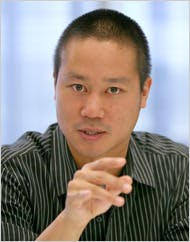I’m a tough sell when it comes to SHRM conference general session speakers.
Some say I’m too tough, but my philosophy is that the majority of speakers SHRM books to help inspire 12,000 or more HR professionals should actually say something that DOES help inspire them and impact how they do their job.
That’s why I loved Zappos CEO Tony Hsieh‘s speech here in Las Vegas on Tuesday. It was, hands down, the best general session address I have heard at SHRM — even better than Al Gore or Jack Welch. And it wowed all the HR pros here in Las Vegas in a way that Richard Branson or Arianna Huffington just couldn’t match.
Why this was a great SHRM speech
What made it such a great speech?
For one, because it allowed Tony to speak to the critical need for a strong company culture and a set of values for all employees. This is what Zappos is known for, and it should resonate with HR people everywhere because what Zappos in managing their corporate culture is what all organization’s should be doing.
Hsieh didn’t start his career with a strong focus on company culture. Early in his career, when he owned a small company called Link Exchange, he simply hired friends and friends of friends. But as Tony notes, that worked well until the company had about 20 employees — “and we ran out of friends.” He had to finally make real hires (non-friends, real employees), and it was during this process that he began to understand how important company culture really is.
Zappos, a company known (and lauded) for selling cool shoes and having a great culture with top drawer customer service, has been lauded and written about over and over again. Much of it came after Zappos was acquired by Amazon.com and there were fears that Amazon would swallow Zappos and its famous culture.
But, Hsieh had a pre-condition before any sale to Amazon could take place: the company had to remain independent so that Zappos could continue to control the company culture. And so it happened. Amazon did not absorb Zappos into Amazon, and they continue to let Hsieh run it as a separate and independent operation — to the benefit of both companies.
According to Tony, Zappos is a “service company that just happens to sell shoes … we want to build the Zappos brand to be about the very best in customer service and customer experience.” To do that, Hsieh and the Zappos team keeps coming back to the same question: How do we wow our customers?
How Zappos wows customers and drives its culture
Good question, and Hsieh gave some examples of things Zappos does that drives company culture and allows them to do all that customer wowing:
- Every applicant that Zappos interviews is interviewed twice — and one is specifically for cultural fit. No one gets hired if they aren’t right.
- Half — 50 percent — of an employee’s performance review at Zappos is about how well they work in the Zappos culture.
- Although many Zappos employees are on social media, the company has a very simple social media policy with just two rules — a) be real, and b) use your best judgment.
- Zappos has 10 core values that employees are expected to live by. Interview questions of job applicants focus heavily on these core values.
- The toughest core value to assess and really get to, according to Hsieh, is “Be Humble.” Sometimes, candidates fail the interview by copping an attitude with the shuttle driver taking them to the airport after their interview is over. As Tony said, “If the shuttle driver has an issue with them, they don’t get hired.”
- Other executives frequently tell Hsieh that although Zappos values and culture are great, “it would never work at my company.” But Tony responds to that by saying, “it doesn’t matter what your core values are … as long as you commit to them” and align the organization to them.
There was a lot more, of course, but Tony Hseih comes off as a confident yet somewhat humble executive who is not only proud of what he has accomplished, but driven to continue to push his customer-focused, culturally-driven business model ahead. That he was able to sell the company to Amazon but be able to continue to lead it and keep the unique Zappos experience independent really says a lot about his skills and ability an an executive.
What great companies have in common
He points to two qualities that are featured in the classic business book Good to Great as the the key qualities that just about all long-time great companies had in common:
- They all had strong cultures; and,
- They all had a vision for the company that had a higher sense of purpose.
Hsieh says that this “higher sense of purpose” is a critical component of company culture as well. “Do what you love and your passion will carry you through,” he said, because it will “get you through tough times, rub off on others,” and will probably help you to be successful.
As I tried to put my finger on why Tony Hsieh was so effective as a SHRM speaker, I kept coming back to this: it’s because people management permeates virtually everything his company does, and is at the core of what makes Zappos successful. While Al Gore and Jack Welch talked about people management and the importance of HR here and there — and did it well, as I have often noted — Hseith’s presentation took it to another level because it is what Zappos is really all about.
So, great speech, great speaker, and a great company. SHRM hit a home run when they decided to schedule Tony Hsieh. Whether you agree with me or not, he’ll be the SHRM speaker that all others are compared to for a long time to come.
